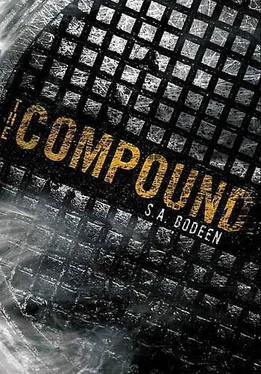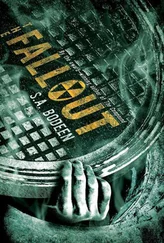My routine also included running six miles on the treadmill in the gym each afternoon. The gym was big, the type you’d see in a school or YMCA, with an extra fifty feet or so at the end for fitness machines. A rower, an elliptical machine, a treadmill, and a recumbent bike made up the cardio part, with a boatload of free weights for the strength portion. No one lifted weights except me anymore.
In the old world, and for a time in the new, Dad was obsessive about exercise. He was obsessive about a lot of things, but exercise was near the top. He told me that a powerful man should have a powerful body as well. He’s the one who got me into lifting and running every day. So I was surprised when he just stopped. It wasn’t a gradual thing, where he’d just skip a day and then start up again. One day he just stopped and I never saw him set foot in the gym again. I didn’t ask why. I never asked why. We weren’t allowed to question our father in the old world, and the same rule applied in the Compound. Anyway, nothing he could say would change our reality.
Besides, I liked having the place to myself. Most of the time. Mom used the cardio equipment when she felt up to it. And once in a while I’d break routine and shoot baskets with Terese.
I lunged, stealing the ball from her a bit too rough. I was careful not to let my hands touch her. Since that first night in the Compound I didn’t ever touch anyone with my bare hands. “You have to protect it, Reese.”
Terese stopped to look at me, her green eyes bright. “I have been thinking about Father.”
As much as I heard my sister speak every day, I could never get used to that English accent. Or the way she called our parents Mother and Father. Like all of us, she had her own routines, one of which was to watch Mary Poppins at least once a day. She must have seen it more than a thousand times. I wished that DVD would finally wear out.
She sucked on one of her braids. “Do you hate him?”
I shot and missed.
Her eyebrows went up. “I just wondered.”
The ball bounced off the wall and rolled back toward me. I retrieved it and dribbled. I ignored her, figuring she’d keep talking anyway. It was nothing new, for her to talk about Dad behind his back, then be all adoring daughter to his face.
She kept on talking. “I do, you see. I think I might hate him.” She caught my pass and did a layup.
I shook my head, rebounded, shot again, then caught the ball when it dropped through the net.
Granted, I wasn’t Dad’s biggest fan. He ran our lives in the Compound the way he had on the outside. The only one who had ever questioned Dad’s decisions was Gram. She was the one person I’d seen stand up to him. The last time Eddy and I went to Hawaii with her, we almost didn’t get to go. And I wanted to go so badly. She lived in a small rural community, all locals descended from long lines of locals, where no one cared who we were. For those short weeks we spent with her every summer, we were just kids from the mainland.
At first, Dad refused. He said we should be at home going to science and math camps. But Gram marched into his office, dressed in a hibiscus-covered muumuu. She emerged a few minutes later, wide smile on her face. Dad had been close behind, a frown on his.
I could only imagine how different things would be in the Compound if Gram had made it.
For the rest of us, challenging Dad’s judgment was out of the question. And I’d stopped asking him the first year whether he’d been able to make contact with anyone on the outside, and how long our supplies of water, food, and power would last. “I’ve planned for every contingency” was his stock reply.
And there was the way he would spend a week in bed, then all of a sudden not sleep for days. Weird. Even then, we never voiced our doubts about his leadership.
Besides, would it have changed our situation? Made things better?
No.
So there was no point. We all knew it.
Terese bent down to tie one of her shoes. They were the same white top-of-the-line cross trainers that we all wore, which lay stacked in boxes in every size in one of the storerooms. “I believe I do hate Father. He did this to us; he made me leave my friends and my school. He makes us stay here.”
Usually I just let her motormouth wear itself out, but I was in an ornery mood. “That’s pretty stupid.” I tossed the ball from one hand to the other. “If we weren’t here, do you know where we’d be?”
“Of course I do.” Terese straightened back up. “We would be home in Seattle with Eddy and Clementine.”
Until that moment, I’d forgotten about Clementine, Terese’s rag doll kitten. Clementine was cute, acted more like a dog than a cat. As allergic as he was, even Eddy played with Clementine until he wheezed.
“Eli, you’d be there with Cocoa.” Her tone was nannyish and condescending.
Just the mention of Cocoa’s name stopped my breath for a minute. My chocolate lab puppy, a constant fixture on my bed and at my side. I missed her. But I pushed away the memories. “You’re being ridiculous. No one is there anymore. You know about the bombs, right?”
“Eli.” Her voice got louder, but she was still matter-of-fact. “Perhaps we could find someone, perhaps others are alive. I hate Father for doing this to us.”
I rolled my eyes and listened to the rant. Little Miss Perfect was losing it. I knew what the whole situation had done to me when I was nine, I couldn’t imagine what adverse effects it had had on an almost six-year-old’s mental state. (Actually I could, given the whole Mary Poppins thing.) Making up a scenario you could live with was easier than dealing with a reality you could not. I understood the benefits of that.
“Okay,” I said.
Her eyebrows went up in sync with the corners of her mouth. “So you do believe me?”
“Of course.” Among other talents, I had always been a decent liar.
Terese’s shoulders drooped. “I miss home dreadfully. I wish we were there with Gram and Eddy.”
“Yeah, well, wish in one hand, crap in the other, and see which fills up first.” I’d also always been a stellar jerk. “Grow the hell up. Eddy’s dead. Gram’s dead. They’re gone. Forever. Deal with it.”
My sister’s mouth dropped open, and then slowly closed. Her eyes narrowed. “You’re not at all like Eddy.”
It was definitely time for her to leave. My toes lined up slightly behind the free-throw line. Every day I shot three hundred of them. I started shooting them the first full day here. After six years, my percentage had improved to eighty-four. “You don’t even remember Eddy. You were too young.”
“I do so remember him.” She tilted her head a bit, studying me. “He looked like you.”
My follow-through was practiced and precise. “That’s a little easy, don’t you think?” Swoosh . “You see me every day.”
Her hands were on her hips. “He wasn’t at all mean like you. He was nice. And he cared more about stuff.”
My first thought was to protest, but I realized it wasn’t worth the breath. She was right. I got the rebound and lined up again. Tried to concentrate. Pretended she was a jeering crowd. It wasn’t much of a stretch.
Terese continued to pounce. “At least he played with me. You never did. You always ignored me. You even teased him for playing with me; you said I was a baby.”
There wasn’t much to say in my defense. In the old world, Eddy and I were so close that I never made a point of reaching out to our sisters. The reason was simple: I didn’t need them. Between school, ballet, and piano, Lexie wasn’t around that much, but Terese was. Eddy always saved time for her.
The ball left my hands. The shot was good.
Terese kept up her rant. “You ignored me in here until I was ten.” Her face was red, but I knew she wouldn’t cry. Early on she learned, as we all did, that tears didn’t help. They wouldn’t bring back anything or anyone.
Читать дальше












